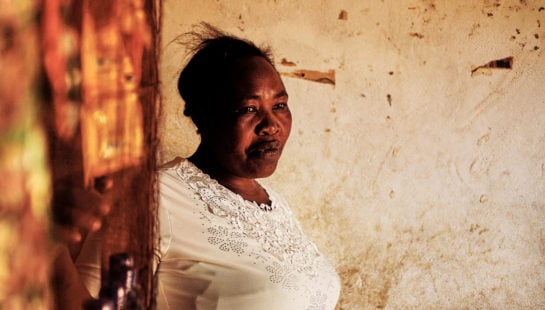Day one: hunger in Uganda
I started my time in central Uganda, usually a place that that is green, lush and highly productive, but today communities are experiencing unseasonal dryness and failing crops. Locals are deeply concerned about what this will mean for them in the coming months and years. Not only are they finding it harder to grow enough for themselves and their families, but they’re unable to rely on income from selling their excess produce at the market.
While I’m seeing wonderful work being done in and through local communities, catastrophic weather patterns are bringing a frightening new challenge. Our local Partners are working hard to help people address this new challenge with the provision of better and different seeds and agricultural practices, as well as opportunities to learn new skills and diversify their income.
Children and young people are being empowered and encouraged to finish their education through smart initiatives. One example is the school feeding program. This has recently been expanded to include early learners, so nutrition is embedded into school from the start.
Day Two: Martha leading the way
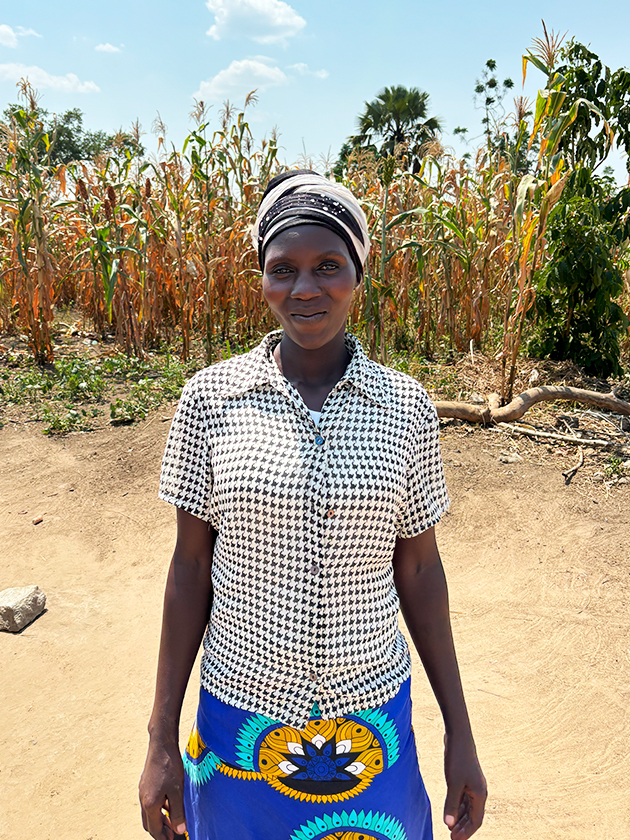
This wonderful woman is a farmer, a toto (mother) of four, and passionate advocate for her community. As a volunteer, she provides a vital link between community members and the project run by our local Partner. She welcomed me into her home declaring I was ‘most welcome’, and I certainly felt that!
Martha is a respected leader who regularly helps her community find solutions to challenges; she is particularly engaged with promoting the rights and participation of women, youth and children.
Remarkably, Martha says that before joining the project she wasn’t very confident, but now she’s very assured about who she is and what she can contribute. She speaks with incredible positivity about the resilience and creativity of her community, and says that more children and youth than ever before are not just in school, but highly engaged in their education—including knowledge of their own rights. Women are developing skills and starting small businesses, and men have changed their attitudes toward women so domestic violence rates are lower, and women are being included in family and community decision making.
Men have changed their attitudes toward women so domestic violence rates are lower, and women are being included in family and community decision making.
Martha delights in seeing her community flourish around her, but expressed grave concern about the rains not arriving as usual. She told me her own maize, along with that of many farmers, has been burnt beyond being able to be harvested by the unseasonal weather.
Day Three: Young People Building A Better World
We met with a Youth Club formed in 2019 and since then, they’ve taken great strides together: developing their leadership skills; engaging in agricultural projects cultivating fruit and vegetables; raising goats for sale at the local market to fund community and group projects; teaching and supporting younger children; educating their community about and advocating against child marriage; and serving their community in various ways, including clearing roads and rubbish.
These young people are a respected voice in the community and are often invited to sit with elders and civic authorities to give their perspective. They told me that they are particularly proud of their achievements in ensuring fewer girls enter an early marriage and importantly, stay at school for longer, and that there’s less juvenile crime in their villages.
Their current plans include every member of the group owning five goats . . . and they’re well on their way to achieving this! But their greatest concern is the weather. No rain has come during this wet season yet, and they’re concerned not just for their own crops, but for village farmers who usually employ them during the harvest time, providing their families with much needed income. The land and the grass are now very dry, and they ask that we pray for rain!
Day Four: Hungry learners
Hungry children can’t learn productively, and their rates of school dropout are high. In projects across the Horn of Africa, including Uganda, children are receiving nutritious, locally sourced food at school, prepared by church and community volunteers.
Day Five: Joan, the entrepreneur
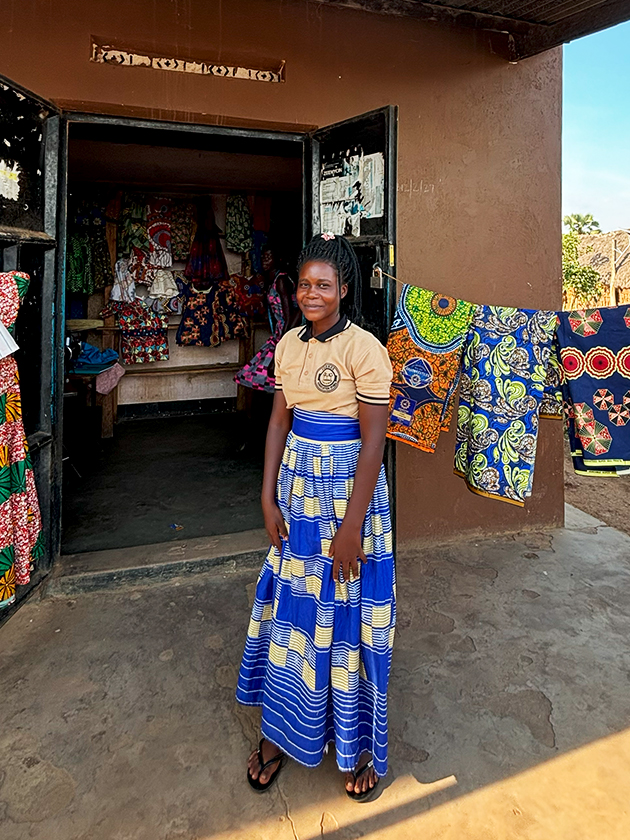
Joan made me ‘most welcome’—perhaps the most beautiful and well-used phrase in all of Uganda!—in her small but very productive tailoring workshop and clothing store. She proudly shared that she’s recently moved into this space from a much smaller one, due to the increasing demand for her services and clothing.
Joan learnt her tailoring skills in one of our local Partner’s community youth projects, and in her own words was, ‘not content just to do the training and sit back.’ So, she set about saving to buy her first sewing machine. Now Joan has five machines, alongside five trainees who are learning to use them and gaining tailoring skills too! Remarkably, Joan is only 21 years old, but she has huge plans. She wants to expand her business even further, buy more machines and train more girls.
Joan says she invites the most vulnerable girls, those in greatest danger of entering a child marriage, to learn from her.
Alongside this great work, Joan’s also a powerful advocate against child marriage in her community, and her income is being used to ensure her own siblings are well educated and able to gain marketable skills.
Day Six: local churches playing their part
Across the Horn of Africa, we’re working with local communities, including the local Church, to provide children not just with an education, but food and water that allows them to learn, play and thrive. In this community in Uganda, the local church worked with the community to build and start this school just a few years ago.
Student numbers have doubled since they began, and they expect them to double again across the next year.
They began with a nursery school, addressing the nutritional needs of the very youngest and most vulnerable children in their community, but demand for older classes was so great that they quickly moved to address this need too. The school employs teachers, but also welcomes the participation of local retired teachers and other community members including totos (Ugandan mothers) who prepare and serve nutritious, locally sourced and food.
Well-nourished children are much more likely to stay in school and enjoy good health and development.
Day Seven: the joy of childhood
What a joy to spend time with children in their local community Child Club!
We were met with smiles, dancing and songs about their rights and needs as children—the need to be protected and respected, for food and education, and for love and care. And then we played soccer with balls they’d made themselves out of plastic rubbish they’d collected, and we learnt to weave mats using local reeds and grasses.
These children are creative, clever and resilient, but they need the things they sang about, and I’m grateful that this is what our work through committed and passionate local Partners can achieve.
Please pray for children who live in poverty across the world, that they would be encouraged and empowered to play, learn and grow.
DAY EIGHT: CASCADING KNOWLEDGE
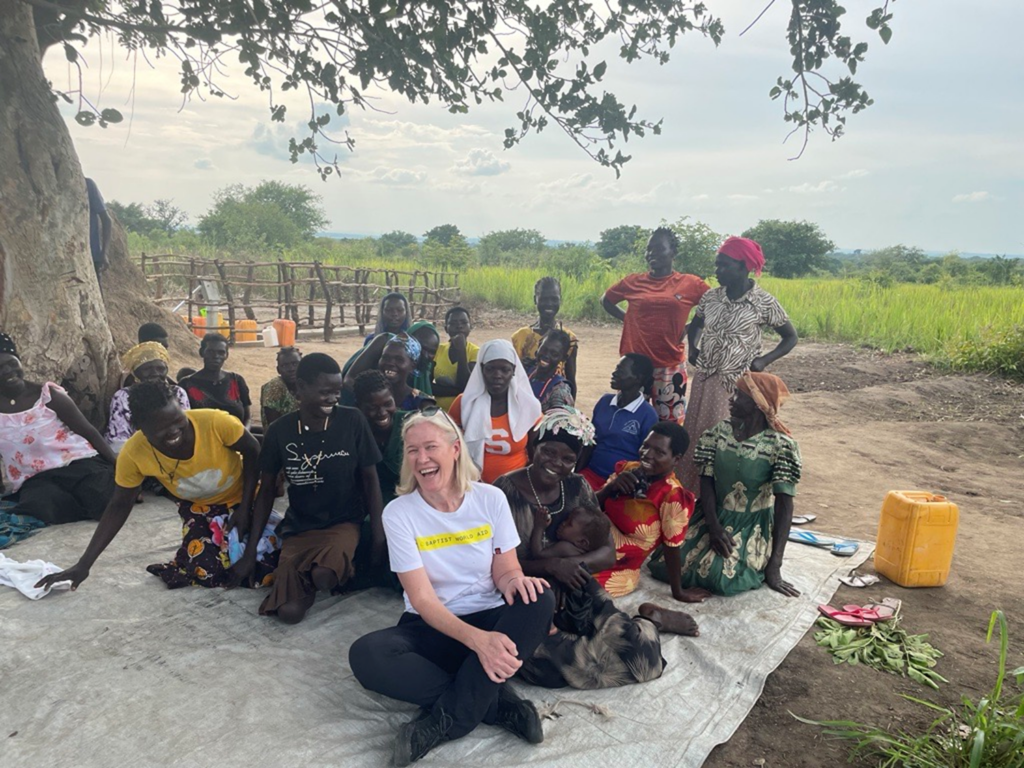
In another part of Uganda, on the border with South Sudan, where there is a very large refugee population—fleeing civil conflict and climate crises. The government gives every refugee family a tiny plot of land to provide for themselves, but it’s the land no one else wants and is generally far from the nearest water source.
In places like this, our Partners mobilise the community to contribute what they can (whether a small financial contribution or physical labour) towards constructing a water well—the first in their area! Volunteers sign up for the ‘water user committee’ where they’re taught how to maintain and repair the well to ensure it can be a reliable source of fresh water for years to come. The joy in this picture is the result of these women, and their children, no longer spending up to six hours a day walking to collect water as they now have ready access to clean, clear water in their village. Instead, women can spend time raising chickens and nurturing their kitchen gardens, and their children are in school on time, with bellies full of clean water and nutritious food from their gardens.
The additional time the women have is also now spent learning about better agricultural techniques, small animal husbandry, nutrition and hygiene, and cultivating their own seeds for their next crop of vegetables to provide for and sustain their families. These women understand how important it is to share their newfound knowledge and expertise and undertake to teach 11 other women each. They call these groups Cascade groups because the knowledge and expertise keep cascading out.
The Ongoing Challenge
At least 36 million people across the Horn of Africa are severely food insecure as countries like Ethiopia, Kenya, Somalia, and now Uganda, experience the worst drought in 40 years.
Conflict and global inflation are compounding factors, with high numbers of people displaced internally and across borders. As families face severe food insecurity, many have left their homes in search of food and water, and pasture for their animals.
Baptist World Aid is responding through local Partners embedded in their communities who know and understand the needs and local context best. Often this work includes school feeding projects, where children receive nutritious and locally-sourced food wherever possible, to ensure they can learn and thrive.

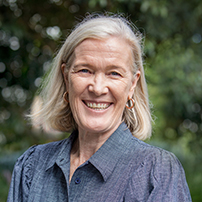
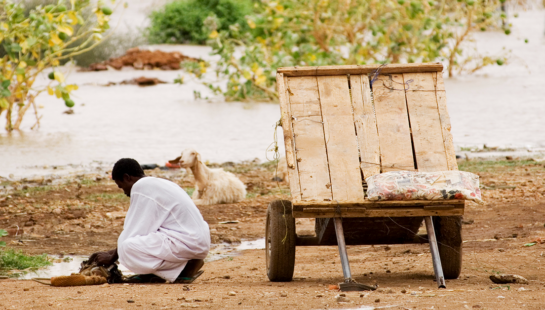
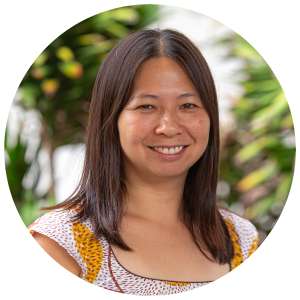 Sophia Russell,
Sophia Russell,
